Books by Jeffrey Agrell
Accompanied Kopprasch
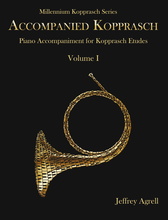
Duet Kopprasch, Vol. I
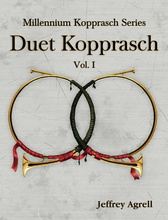
Preparatory Kopprasch
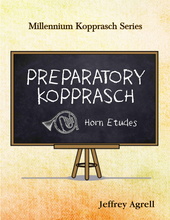
Harmony Kopprasch, Vol. I
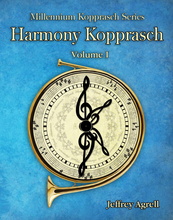
Rhythm Kopprasch, Vol. I

Horn Technique: A New Approach to an Old Instrument
(2017, 447 p., 48 Chapters, + extra articles & resources)

The Creative Hornist
(2017, 228 p., 30 chapters)
Improvisation Games for Classical Musicians
published by GIA Publications. 354 p. (2008)
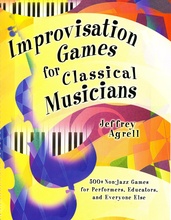
It is a collection of 500+ games of all kinds that enables traditionally trained instrumentalist, vocalists, pianists, educators, students, amateurs, professionals, composers, music therapists, pianists, conductors, and even jazz players to create their own music without jazz, and includes extensive explanatory and resource material. Table of Contents listed at the bottom of this page.
Improvisation Games for Classical Musicians, Vol. II
2016, 372 p. Published by GIA. It offers 642 new improvisation games.
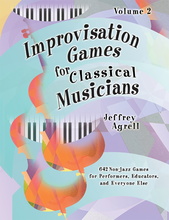
Improv Games for One Player, a portable book of games for one player for use in warm-ups and working on technique and musicianship. 50 p. (2009, GIA):
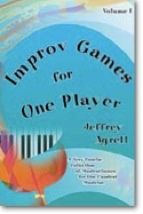
Improv Duets for Classical Musicians, a portable book of improv games for 2 players. 2012, GIA. 46 p.
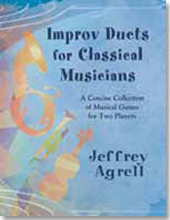
Improvised Chamber Music, a portable book of improv games for four (or 3 or 5) players. 2012, GIA. 52 p.
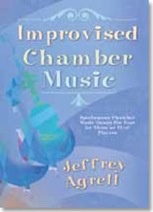
Comments on Improvisation Games for Musicians:
Jeffrey Agrell's Improvisation Games for Classical Musicians is one of the most inspiring and innovative books I have come across since reading John Steven's revolutionary "Search and Reflect" fifteen years ago. In a world where the musical landscape seems to change every minute and where styles, genres and performing traditions from every corner of the world combine daily in myriad 'unheard of' ways, it is clear that one of the most valuable abilities that any music can possess is the ability to improvise. For those musicians who have never improvised, Agrell provides a huge number of easily accessible and comprehensible ways to get involved with the process. Though the book’s title clearly suggests an audience of musicians in the classical tradition, I feel that the majority of the exercises would be equally challenging, effective, and educational for musicians from established improvising traditions such as jazz or Indian classical music. Many of the ‘game’ pieces could serve as both simple classroom exercises or as conceptual guidelines for extended improvised performances. The musical range and variety of games, exercises, suggestions and methods presented is astonishing in both breadth and depth. The book is a real ‘must read’ for music educators (either in private tuition or in ensemble settings) who want to open up their student’s understanding of the real creative possibilities of music. It will be equally useful to any musicians of any level of experience who wish to expand the creative and expressive range of their playing.
–Jared Burrows, PhD, author of Resonances: Exploring Improvisation and Its Implications for Music Education
Improvisation Games for Classical Musicians is a treasure. One of the most imaginative, helpful, friendly, liberating books about being a musician that I’ve ever seen.
– Composer/Critic/Educator/Writer Greg Sandow, in his blog on the Future of Classical Music
An extraordinary ground-breaking and enjoyable textbook is Improvisation Games for Classical Musicians: 500+ Non-Jazz Games for Performers, Educators, and Everyone Else by Jeffrey Agrell (2008). This book includes a syllabus for an Introduction to Improvisation course for eight to sixteen students. The section devoted to the general music student includes warm-ups, drum circles, call and response games, body percussion and soundpainting (www.soundpainting.com). - Michael L. Mark and Patrice Madura in Music Education in Your Hands: An Introduction for Future Teachers, 2011, Routledge, p. 36.
[Jeffrey Agrell's new book] provides classical musicians with a more-than-generous pool of inspirations, whether teaching or working solo or in any ensemble, and jazz as well as experimental musicians can also benefit from it. The presentation form is almost encyclopedia-like in its systematic disposition of the material. A must-have for so many college and university libraries - an innovative resource not to be overlooked.
–Carl Bergstroem-Nielsen, lecturer in ensemble improvisation in Music Therapy, Aalborg University, Denmark
Improvisation Games for Classical Musicians by Jeffrey Agrell is an amazing contribution to both the education and enjoyment of all who are interested in musical performances of any kind. The design, the content, and especially the manner in which Jeffrey has presented his wildly creative materials is brilliant. Add to that the fact that what this book addresses is the most neglected and, perhaps the most important aspect of classical musical growth. With this book teachers and performers alike have a wide open door to years of exploration and learning in how to express themselves through their music and free themselves from a total dependence on the printed page and the deeply ingrained traditions of the classical music traditions.
The book is a joy to read, and I can only imagine the impact it will have on students, teachers, and professional musicians who take the time to step outside the rigid confines of their limited training.
–Douglas Hill, Professor of Music, University of Wisconsin-Madison
A dazzling array of stimulating formats that open entirely new doorways to the art of improvisation for virtually any musician imaginable. Ideal for classical musicians who are just getting started, but also a useful tool for experienced improvisers seeking to expand their horizons. Jeffrey Agrell has made an important contribution to the field.
–Edward W. Sarath, Professor of Music (Jazz and Contemporary Improvisation Studies), University of Michigan; founder of ISIM (International Society of Improvised Music)
Jeffrey Agrell’s book, Improvisation Games for Classical Musicians, provides simple and powerful activities which can open up whole new worlds to musicians of any level of experience. He really hits the right notes as it were, in giving students something, but not too much, to hang on to as they explore the world of improvising. It’s a fantastic compendium of ideas, a set of procedures which are fun to do and which lead to profound results. Bravo!
-Stephen Nachmanovitch, author of Free Play: Improvisation in Life and Art
Improvisation Games for Classical Musicians is an essential book for any teacher or musician who is truly serious about learning or teaching students to "speak" their own music. I give it my highest recommendation!
-Dr. Charles Rochester Young, Composer/Professor of Music, University of Wisconsin-Stevens Point
I was most intrigued by Jeffrey Agrell's book, Improvisation Games for Classical Musicians. As a classically-trained hornist, improvisation has always been a world of both mystery and fear. During my 27 years as a high school band director, I was always fearful of improvisation. I knew I could "fake" my way through the style issues, but you can bet I searched for the jazz ensemble arrangements that had the solos written out! This book takes much of the "mystery" out of improvisation.
This book has made me think of "why we play" and "how we learn to play" in a completely different context. Agrell's correlation between how we learn reading and language and how we teach music has given reason to question many of today's music education methodologies. What is amazing is that for years we have approached music instruction in ways that defy the logic so plainly laid out in other subject areas. It is surprising that we have been as successful as we have been and clearly, we can be much more effective utilitizing many of the processes described in this book.
I especially see great potential for Agrell's games in beginning music classes. The first six months of beginning band don't have to be the nightmare they so often are. I think in our efforts to get them ready for the next level we have forgotten the most important ingredient - fun. These games are much more than games. They could be the keys to success for all the students, not just those who survive traditional instructional methods. The innate motivation that comes from student successes, student involvement, and student ownership would be instant byproducts of these games. Most beginning methods focus on reading notes before playing them. We don't teach students to write language before they can speak the language - so what are we doing? I think we probably are working harder than we need to and are unintentionally denying success for many of our students. by incorporating many of the games in this book and using them in conjunction with existing methods, I think we can increase retention, learning, and content at all levels of music education.
Jeffrey Agrell's games are applicable at any age and for every level of development and instruction. The games provide ways to make teaching music technique at multiple levels as well as daily warm-ups fun, exciting, and most important, delivered in a way that maximizes comprehension. This is definitely a book that is long overdue, and all music educators should take a look at it.
-Mark Lane, Associate Director of Bands, Professor of Music Education, Central Washington University, President, Washington Music Educator's Association, review in The Horn Call, journal of the International Horn Society, May 2008
Improvisation Games for Classical Musicians: 500+ Non-Jazz Games for Performers, Educators and Everyone Else by Jeffrey Agrell is a virtual encyclopedia of creativity-enhancing musical experiences that, simply put, could not be more enjoyable or satisfying. Truly, every level and style of performer can benefit from the “games” that are designed to teach listening skills and freedom of expression through experimentation with sound musical concepts. The games are clearly explained, impeccably organized by musical goal, beautifully presented, and enhanced by inspiring quotations from master improvisers. The book is perfectly suited as a textbook for a complete course in musical improvisation, or as a creativity supplement to any music course, ensemble or studio. I cannot wait to use it in my classes, and to personally play all 500+ games! This book is a unique and desperately needed contribution to help all musicians, even the most sophisticated, to “play” music better. Kudos to Jeffrey Agrell!
-Dr. Patrice Madura, Associate Professor of Music, Indiana University
Written to assist classical musicians in developing their improvisational skills, Jeffrey Agrell's book will offer great resource material to teachers and students who seek a fun manner in which to practice these skills.
–Journal of the International Trumpet Guild
There is little doubt that classical musicians can grow enormously by feeling part of the creative process. The author provides an exhaustive set of games for getting from here to there. These games are designed to develop listening, melodic, technical, and motivic chops. There are created for nearly any number of players to work on simultaneously. Improvisation Games is... a broad resource for all musicians interested in diving into the improvisation pool, whether entering head-first or perhaps only after a tentative testing of the waters. It is for the fain-at-heart and for those with a bold streak who wish to energize their musical life. Let the games begin!
–The Flutist Quarterly [journal of the National Flute Association]
Comments on Improv Games for One Player
Improv Games for One Player is a fantastic resource for teachers and players alike. Derivatives of some of the exercises can certainly be used with beginning and intermediate students. Doing so may even provide the extra inspiration needed to learn those scales and arpeggios. As Agrell advocates, improvisation serves as an important component in achieving "comprehensive musicianship." Including this book on the music stand will provide a varied and thorough approach by which to begin the path toward this lofty goal.
–The Flutist Quarterly
In addition to providing almost fifty different improvisation games with a variety of applications, Agrell also includes chapters at the end of the book that present different patterns and scales, list different styles and forms, and list a selection of familiar tunes. All of these additional chapters contain information that can be applied to the various improvisation games throughout the remainder of the book. The games are designed for one player, but it is possible for more than one player to participate in many of the games.
This book would be quite useful for classical musicians with a good grounding in music theory that want to get experience improvising in a way that builds upon traditional classical music education. This book would also be valuable for instructors of all levels because it provides good exercises for improvisation that can be as simple or as complicated as needed. Many tuba and euphonium students receive few opportunities to improvise on their instruments unless they pursue jazz performance. It can give tubists and euphoniumists another way to experience improvisation outside of the jazz idiom. This book is highly recommended for students and educators alike.
–Journal of the International Tuba and Euphonium Association
The May 2008 review of [Improvisation Games for Classical Musicians] was very positive and those positive aspects are echoed here. Since this volume is for one player, however, I believe it addresses the needs of classical musicians more directly, giving them virtually an infinite number of ideas to play with in practice (i.e. in private) – well, infinity will be possible if his encouragement is followed: “1. Open Book; 2. Get idea; 3. Close book; 4. Play. And play. And play.” While the big 2008 version is especially recommended for teachers, this volume is recommended for every individual. I’ve used his ideas on my own, in classes (my studio did a 10-week study of the big book), and in lessons. Once “buy-in” is achieved, the results are remarkable – more willingness in risk-taking, and a more highly developed sense of humor (we’ve even performed improv games in public!). These are all things we need to keep music alive in ourselves and in the world. Play. And play. And play.
–Journal of the International Horn Society
Comments on Improv Duets for Classical Musicians
Jeffrey Agrell is one of the most important advocates for improvisation in the classical music world today. His greatest gift is his ability to create games and exercises that make learning improvisation fun not scary. The approach is engaging, insightful and humorous. Players of any instrument will love these fun and imaginative improvisation duets. – Charles Young, University of Wisconsin-Stevens Point
Jeffrey Agrell continues to contribute, through his intense enthusiasm, his immense intelligence, and his relentless pursuits, to provoke us all to step inside ourselves to find out what we already know and can already do, but don’t think that we know or feel able to do. Creativity through equal partnership is the angle here. Duets are what we do every day as we converse with another person. Through our own words we communicate feelings, emotions, and thoughts. We attempt to convince, cajole, or confuse via spontaneous (improvised) verbal actions and reactions with others, most often without a script of any kind. Improvisation through one's musical instrument in reaction to another is what Agrell encourages as he presents a multitude of intriguing ways for us to discover and enjoy our innermost capabilities to communicate through the abstractions of pitches, timbres, rhythms, and dynamics. This is a book to buy, study, use, and cherish as it encourages classical performers to relax, relate, and ultimately realize the music that is their very own. –Douglas Hill, Professor Emeritus of Horn, University of Wisconsin-Madison
This portable volume has everything you need to get started improvising with a partner. Unlike the usual printed duets, these duets provide an opportunity for two people playing any (or multiple) instruments to create music without written notation. This is especially valuable in a pedagogical setting, where improvising with a partner can provide a fresh approach to working on technical as well as musical issues. I know I will use this book frequently with friends, colleagues, and students to help me incorporate improvisation more regularly into my musical day. With Professor Agrell's improvisation resources, all musicians (but especially "classical" musicians) now have an outstanding set of tools that will help them dare to try something new, while also further developing deep listening skills, refining technique, opening up musical creativity, and providing hours of fun for a lifetime of music-making. No matter what your previous experience with improvisation (none or a lot), you will definitely want this volume in your library. – Dr. Lin Foulk, University of Western Michigan
Comments on Improvised Chamber Music
Jeffrey Agrell has written some of the most lucid material there is to open up the realms of improvisation for classically trained musicians. Each of his games provides a nugget of form around which an improvisation can crystallize. He provides a wonderful balance between a feeling of security and the freedom for musicians to play as themselves.
– Stephen Nachmanovitch, author of Free Play
Improvisation is an essential component to the musical development of our students. In this latest offering from Jeffrey Agrell, teachers and students will discover the joys and benefits of improvising. Jeffrey removes the fear and mystique of the improvisational process and empowers all to explore their creative capacities. With his imaginative and accessible suggestions, suitable for any context, the door to limitless possibilities will be opened. This is a resource that needs to be in every band room. Students have astonishing abilities to create. Give them the opportunity. Start today – your program will be forever changed!
–Ardith Haley, Acadia University and Arts Education Consultant for the province of Nova Scotia
Improvised Chamber Music offers a treasure trove of inspiration and ideas, in sound structures and musical games, a reference to patterns, styles and forms, but moreover a playful invitation into the adventure of improvising in ensemble with others. The games work well and are fun for any group, regardless of skill level, instrumentation or experience, with a wealth of suggestions to guide participants through the exploration of collective improvisation. –LaDonna Smith, author, recording artist, and editor of The Improvisor
Jeffrey Agrell’s new book Improvised Chamber Music is an extremely useful and delightfully portable resource for classical musicians looking for ideas and structures for improvising in small groups. I'm excited to use it as a text for my improvised chamber music students, and as a resource for my own music making.
–Eric Edberg, classical improviser and Professor of Cello at DePauw University